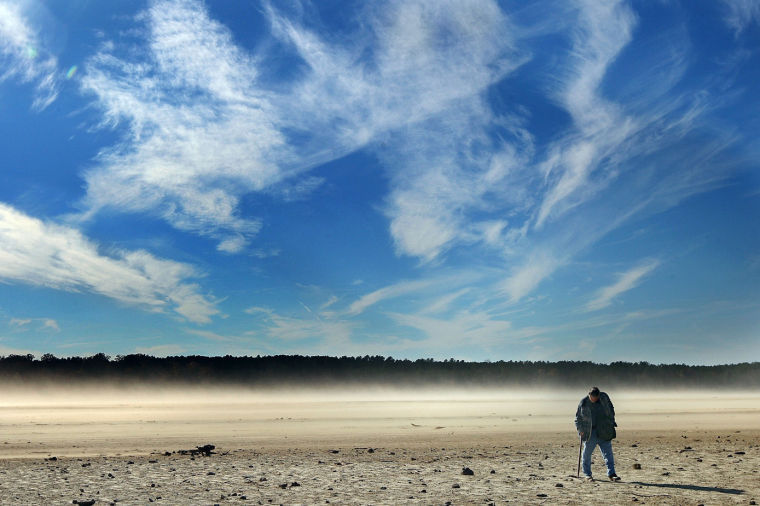Drip, drop
High winds cause a dust storm across the dry lake bed of Falls Lake in North Carolina, Dec. 3, 2007.
February 12, 2014
You never know how good something is until you’ve wasted it.
I grew up with the knowledge that water is extremely precious and at constant risk of running out, which is known to be true. I live with this attitude and try to decrease the amount of water I waste every day.
My Australian childhood consisted of daily three minute showers with a bucket on the floor for company, turning the tap off while I washed my hair, and watering the garden once a week after 7 p.m. with the water that was collected in the shower bucket. We treated water as if it was the most valuable resource in the world, and these days it actually is.
According to the Tufts University website, we are currently facing a global water crisis. Water is a resource that is unrenewable, vital for human life, and thus irreplaceable.
Upon my arrival to the United States, I was shocked at the water wastage that occurred each day in the dorms. I watched in astonishment as a fellow freshman left the tap running while she brushed her teeth for two minutes.
More than a gallon of water is wasted for each minute that the faucet is running, according to Waterwise, and as people are recommended to brush their teeth for two minutes twice a day, the girl aforementioned wastes around two gallons every single day. In my mind, that is simply unacceptable.
Reverting back to my water conservation instincts, I promptly walked over and turned the running tap off. The fact of the matter is that children, students and adults alike are all committing the same crime against the environment.
According to the City of Pullman Water Conservation website, to become more serious about saving water you can do things like cover up the pool, only turn the dishwasher and laundry machine on when they are full, fix any dripping faucets or pipes, and turn the water off while you brush your teeth.
Pullman residents realized just how valuable water is in week three of this spring semester.
On Jan. 27, the Pullman Chamber of Commerce informed the public that natural sediment from the bottom of the Landis Reservoir was causing the city’s water to turn brown, affecting many students here at Washington State University.
While the water’s chlorine dosage was increased and the water was reported safe to drink, complaints were received, according to Pullman Chamber of Commerce Office Manager, Debbie Mitzimberg.
If anything, this incident shed light on how much people take water for granted. When there’s clean, drinkable water, wasting it occurs without a second thought. Once it becomes unavailable, the importance of it is realized.
Water saving methods can be advertised and recommended, they can be thrown in your face or they can be hung up on a poster in the back of a classroom. The only thing that is really going to change the way water is used is if people’s attitude towards water is transformed.
–Sarah Steger is a sophomore communication major from Perth, Australia. She can be contacted at 335-2290 or by [email protected]. The opinions expressed in this column are not necessarily those of the staff of The Daily Evergreen or those of Student Publications.





















